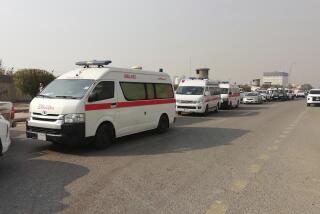Iran still fuels Iraq violence, U.S. alleges
- Share via
WASHINGTON — Two top U.S. military commanders said Tuesday that Iran continues to train and direct violent Shiite militias in Iraq and is attempting to permanently weaken the Iraqi government.
Iran has become the biggest long-term threat to Iraqi stability and is encouraging radical elements among the Shiite population to continue attacks even as some prominent militia leaders push for cease-fires, said Army Lt. Gen. Raymond T. Odierno, who just completed a 15-month assignment as day-to-day commander in Iraq.
“This is about keeping, in my opinion, a weak government in Iraq,” Odierno told reporters at the Pentagon. “I think Iran benefits from that.”
Navy Adm. William J. Fallon, commander of all U.S. forces in the Middle East, was more conciliatory during a Senate hearing, saying this week’s visit to Baghdad by Iranian President Mahmoud Ahmadinejad was a “mixed bag” because it offered an opportunity for Iraqi leaders to push Iran to take further steps to stop the flow of weapons and bombs into Iraq.
But pressed by members of the Senate Armed Services Committee, Fallon said there was still evidence that Iran was training militants and providing them with weaponry.
“I have yet to see anything since I’ve been in this job in the way of a public action by Iran that’s been at all helpful in this region and particularly . . . in Iraq,” he said.
Iran’s role in Iraq remains an intensely debated issue among U.S. policymakers. Though many accuse Tehran of continued meddling, others credit Iranian restraint with helping to reduce violence in Iraq over the last year.
Most visibly, there has been a sharp decline of sophisticated roadside bombs known as explosively formed penetrators, which American officials allege are manufactured exclusively in Iran.
Also, radical Shiite cleric Muqtada Sadr, the most prominent anti-American leader in Iraq, recently extended a cease-fire by his loyalists despite his close ties to Iran.
But Odierno said the importance of Sadr’s cease-fire had been overstated and that Iranian operatives had been working to peel off radical elements of Sadr’s militia, the Mahdi Army, to continue fighting.
Odierno noted that Ahmadinejad was able to travel Iraqi roads unmolested by violence during his two-day visit, citing that as evidence that Iran could start and stop Shiite-backed attacks at will.
“Whenever a visitor would come from the United States, we’d either foil a rocket attack or the rocket attack happened,” Odierno said. “That’s because it was being done by Iranian surrogates. And when the government of Iraq holds a meeting, there tends to be rocket attacks. Why is that? Because it’s done by Iranian surrogates.”
Odierno, who was recently nominated to become vice chief of staff of the Army, said he agreed with Army Gen. David H. Petraeus, the overall commander in Iraq, that ongoing troop withdrawals should be suspended after July when force levels return to where they were before last year’s buildup.
He also suggested that when Petraeus next gives Congress his recommendations for the Iraq campaign, in April, it may be too early to determine whether troop reductions could continue through the end of the year.
--
More to Read
Sign up for Essential California
The most important California stories and recommendations in your inbox every morning.
You may occasionally receive promotional content from the Los Angeles Times.










